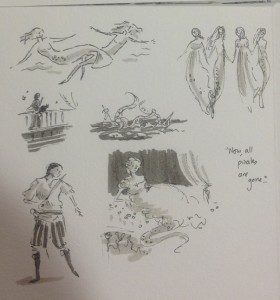
Art by Kathleen Jennings
In Sourdough and Other Stories, there is a tale called “The Navigator”, about ships and sirens and men with wings who act as navigators for said ships. There is a nameless narrator who may or may not die at the end, and who may or may not be a pirate … but there are definitely pirates in that world. I had the title, “Now, All Pirates Are Gone” scribbled down for another story that never made it into Sourdough.
When I was writing Bitterwood, I went back to my Sourdough notes and found that title and knew that it belonged in the new collection. I wanted a pirate story that was a bit more than seeking lost treasure and run-ins with the authorities. I thought about how Royal Navies were always trying to wipe them out, and I wondered about how someone might succeed. I found the tale of the ghost ship Caleuche in Chilote mythology and that gave me the name of the mysterious island. I knew I wanted to connect this tale with the action of “By My Voice I Shall Be Known”, and the unknown protagonist’s line ‘How long before she, too, chooses the water?’
I love my pirates. I love Maude and Sancha and Hieronymus the cat. I’m very fond of Edine, though she’s both stupid and dangerous.
Now, All Pirates are Gone 
The sea is strangely silent tonight and this makes Maude and her crew nervous.
Beneath their collective worn canvas shoes, bare feet, and thick soled boots, the brig’s deck is steady as Astra’s Light moves through the waters with nary a noise, and only the slightest shhhh’ing as the bow splits the flat mirror of liquid salt. Ahead of them, the island lies low, relaxed, a dark hunched thing against the blue-black sky, seemingly boneless as those chickens Maude’s aunt sometimes bred, the ones that weren’t quite right. But from the centre of Isla Caleuche rises a tower, straight and tall as a luring finger, saying Come hither.
The breeze that pushes them toward their goal is strong, warm – indeed, hot – and the night air is humid. Maude wipes at her face with an embroidered kerchief. The thing was not meant for such rough use and is frayed, discoloured after five hard years. Soon it will be little more than a rag, but she won’t discard it for it was a gift from the mute woman with auburn-rose hair they’d plucked from the sea, back when the oceans were kind and full of bounty. When the business of piracy was at its peak and all but the worst captains could afford to, and did, display some compassion and a reasonable degree of generosity. The folk of the Astra’s Light didn’t know how long the woman had floated, and they couldn’t figure how she hadn’t drowned, but her skin had turned as furrowed as a crone’s frown and it took days of pouring fresh water into her mouth and applying rich unguents (from Maude’s own stock, thank you very much) to make her even begin to look human once more.
Grateful, the woman had made herself useful – darning ragged pants, shirts and skirts, socks and stockings. Making serviceable bunk-blankets for the whole crew out of the worsted wool, calico and felt from an Argosy they’d “lightened” but days before; and a fine coverlet of green and gold brocatelle for Maude and Sancha’s bed. Men and women all began to regard her as something of a mascot, a pet to replace the cat that had disappeared in a storm a week earlier. The woman couldn’t write or speak, so Sancha had begun teaching her letters. By the time they’d set her ashore at Cwen’s Reach, she’d made a silken shawl for Sancha and the fine cambric kerchief for the captain, Maude’s initials embroidered in one corner and cleverly stitched now-mermaids-now-maidens gambolling around the edges, tail to feet and back again. Maude, who had the full complement of sailors’ superstitions to give her ballast, came to regard the piece of fabric as something of a lucky charm. In her career, she’d had her share of accidents – a shoulder dislocated from hanging out a window, stab wounds from any number of ill-wishers and naval men, powder burns from unexpected and inconvenient explosions – but from the day the kerchief came into her possession she’d been unusually incident- and injury-free.
When they’d made harbour at Cwen’s, Sancha had accompanied the woman, and left her with one of the Little Sisters of St Florian at the Citadel – which was the closest thing to a charitable institution the port town had. It seemed like the best place, Sancha later said, as she showed Maude the new ship’s cat she’d acquired, a black and gold kitten five months or so old, standoffish and wise as it sat on the bed beside them, observing their state of undress with a kind of disdain. Or perhaps the distaste was for her name: Hieronymus.
It was only some time after she’d gone, the woman, and the seas seemed to change their tenor, that they wondered if she was the beginning of their ruin.
***

